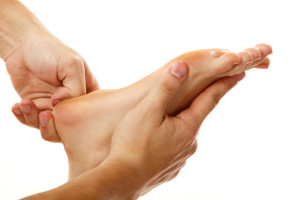 Peripheral neuropathy (PN) is a general term for damage to various types of nerves, but most colloquially refers to damaged sensory nerves that carry sensation (pain, temperature, vibration, and proprioception—your sense of location in space) from the body to the brain. Damage may result from direct insult to the peripheral nerves, either mechanical (blunt/crush/severing injury) or chemical (diabetes/metabolic diseases, B12 deficiency, medicines, alcohol, toxic chemicals). Additionally, compromised blood supply can damage these nerves (inflammation, autoimmune conditions, certain infections “idiopathic”). When a nerve is damaged, it may constantly “fire”, or signal, the brain as if it were being stimulated. Painful sensations are perceived (sharp pain, pressure, burning, freezing, vibrating, pins/needles, electric, sharp-shooting or swollen sensations), even though the initial irritation/stimulus has been removed (see also, complex regional pain syndrome).
Peripheral neuropathy (PN) is a general term for damage to various types of nerves, but most colloquially refers to damaged sensory nerves that carry sensation (pain, temperature, vibration, and proprioception—your sense of location in space) from the body to the brain. Damage may result from direct insult to the peripheral nerves, either mechanical (blunt/crush/severing injury) or chemical (diabetes/metabolic diseases, B12 deficiency, medicines, alcohol, toxic chemicals). Additionally, compromised blood supply can damage these nerves (inflammation, autoimmune conditions, certain infections “idiopathic”). When a nerve is damaged, it may constantly “fire”, or signal, the brain as if it were being stimulated. Painful sensations are perceived (sharp pain, pressure, burning, freezing, vibrating, pins/needles, electric, sharp-shooting or swollen sensations), even though the initial irritation/stimulus has been removed (see also, complex regional pain syndrome).
Those with peripheral neuropathies must inspect the affected area daily for foreign objects, cuts, etc. in order to avoid progression to serious infection; impact sports are not recommended. Conventional medical treatment depends upon the cause: for example, improved diabetes management prevents further nerve damage. Certain peripheral neuropathies, such as those due to medications like anti-cancer medications, improve or resolve upon discontinuation of the medication. Pain management consists of medications to treat neuropathic pain: medicines in the anti-depression, anti-seizure, anti-inflammatory and opiate classes are mainstays. In the case of clear autoimmune pathology, direct antibody removal (plasmapheresis) is very occasionally used. In the case of localized nerve involvement, surgical or other nerve ablation may stop pain.[1]
Body acupuncture, especially when combined with electrical stimulation and Neurological Scalp Acupuncture, can produce expedited improvement in reversible neuropathies, especially recent-onset, toxic neuropathies. Neuropathies due to completely severed or otherwise irretrievably damaged nerves are not amenable to acupuncture. Generally, after about 8-12 visits, the patient experiences a moment when the acupuncture needles suddenly become quite bothersome: this signals maximal pain/sensation improvement from acupuncture.[2 3 4]
Neurological Conditions Testimonials
Learn more about Peripheral Neuropathy
X
These brief overviews of conditions represent distillations of basic and current medical reviews from the following sources:
[1] Conventional Medical Sources
“Harrison’s Principles of Internal Medicine: Volumes 1 and 2, 18th Edition”. Dan Longo Anthony Fauci, Dennis Kasper, Stephen Hauser, J. Jameson, Joseph Loscalzo. McGraw-Hill Professional; (July, 2011)
Medscape eMedicine Physician’s online resource. Various review articles:
Complex Regional Pain Syndromes Treatment & Management.
Anthony H Wheeler MD. Medscape Reference Chief Editor: Stephen A Beman, MD PhD MBA.
Essential Tremor
Deborah A Burke, MD Clinician, Sub-Investigator, Movement Disorder/Parkinson’s Disease Center, University of South Florida College of Medicine; Investigator, Physician, Roskamp Institute Memory Clinic
Bell Palsy
Danette C Taylor, DO, MS Clinical Assistant Professor, Department of Neurology and Ophthalmology, Michigan State University College of Osteopathic Medicine; Senior Staff Neurologist, Henry Ford Health Systems
Meniere Disease (Idiopathic Endolymphatic Hydrops)
John C Li, MD Private Practice in Otology and Neurology; Medical Director, Balance Center
Restless Legs Syndrome
Ali M Bozorg, MD Assistant Professor, Comprehensive Epilepsy Program, Departments of Neurology and Neurosurgery, University of South Florida College of Medicine
Postherpetic Neuralgia
W Alvin McElveen, MD Director, Stroke Unit, Lakewood Ranch Medical Center; Neurologist, Manatee Memorial Hospital
Sleep disorders
Roy H Lubit, MD, PhD Assistant Clinical Professor, Mount Sinai School of Medicine; Clinical Faculty, Department of Child Psychiatry, New York University School of Medicine; Private Practice
Tinnitus
Aaron G Benson, MD Director, Ohio Hearing and Balance Institute, Maumee, Ohio; Consulting Staff, Toledo Ear, Nose and Throat, Inc
Multiple Sclerosis
Christopher Luzzio, MD Clinical Assistant Professor, Department of Neurology, University of Wisconsin at Madison School of Medicine and Public Health
Parkinson Disease
Robert A Hauser, MD, MBA Professor of Neurology, Molecular Pharmacology and Physiology, Director, USF Parkinson’s Disease and Movement Disorders Center, National Parkinson Foundation Center of Excellence, Byrd Institute, Clinical Chair, Signature Interdisciplinary Program in Neuroscience, University of South Florida College of Medicine
Tourette Syndrome and Tic Disorders
William C Robertson Jr, MD Professor, Departments of Neurology, Pediatrics, and Family Practice, Clinical Title Series, University of Kentucky College of Medicine
Post Concussive Syndrome
Roy H Lubit, MD, PhD Assistant Clinical Professor, Mount Sinai School of Medicine; Clinical Faculty, Department of Child Psychiatry, New York University School of Medicine; Private Practice
Traumatic Brain Injury
Segun T Dawodu, MD, JD, MBA, LLM, FAAPMR, FAANEM Associate Professor of Rehabilitation Medicine and Interventional Pain Medicine, Albany Medical College
Dizziness, Vertigo, Imbalance
Hesham M Samy, MD, PhD Head of Hearing and Balance Unit, Otolaryngology Department, Minia University, Egypt
CNS Causes of Vertigo
Marcelo B Antunes, MD Resident Physician, Department of Otorhinolaryngology-Head and Neck Surgery, University of Pennsylvania Health System
Communication Disorders
Renee S Melfi, MD Consulting Staff, Orthopaedic Associates of Central New York
[2], [3]
- “Acupuncture Energetics: A Clinical Approach for Physicians”. Joseph M. Helms. Medical Acupuncture Publishers; 1st Edition. (1995)
- “Foundations of Chinese Medicine: A Comprehensive Text for Acupuncturists and Herbalists”. Giovanni Maciocia. Churchill Livingstone; 2 Edition (July, 2005).
- “Diagnosis in Chinese Medicine: A Comprehensive Guide”. Giovanni Maciocia. Churchill Livingstone; 1st Edition (January, 2004).
Chinese Scalp Acupuncture”. Jason Ji-shun Hao, Linda Ling-zhi Hao and Honora Lee Wolfe. Blue Poppy Press; 1st Edition. (November, 2011)
